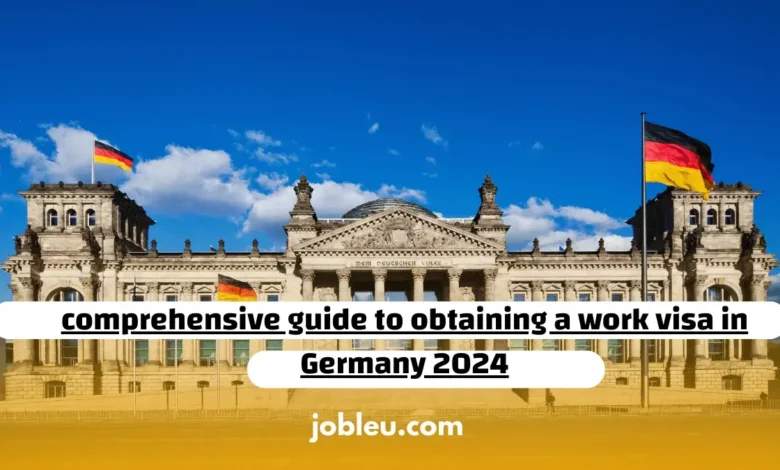Comprehensive Guide to Obtaining a Work Visa in Germany 2024

Understanding the Types of Work Visas in Germany
When exploring professional opportunities in Germany, it’s essential to understand the variety of work visas available to foreign nationals. Germany’s work visa options are designed to accommodate different employment scenarios, skill levels, and nationalities. Among the most commonly pursued are the EU Blue Card, the EU Work Permit, the Intra-Corporate Transferee (ICT) Card, and other specialized work visas tailored to specific professions.
The EU Blue Card is a prevalent choice for highly skilled non-EU employees, particularly those in technical, scientific, or IT sectors. Applicants must hold a university degree and a binding job offer with a minimum annual salary threshold, which is adjusted regularly. The Blue Card allows holders to reside and work in Germany and offers a pathway to permanent residency after 33 months of employment, or 21 months if the applicant has acquired sufficient German language proficiency.
For those who do not meet the EU Blue Card criteria, the EU Work Permit provides an alternative. This visa targets a broader range of employment sectors and skill levels. Eligibility typically requires a job offer and proof that the position cannot be filled by an EU national, a process overseen by the Federal Employment Agency. The work permit also accounts for seasonal jobs and provides the flexibility of renewing or extending the visa based on continued employment.
The ICT Card caters to multinational companies looking to transfer their employees to their German branches. This visa is specific to managers, specialists, and trainees within the company and requires proof of employment for at least six months with the sending company. The ICT Card offers a duration of up to three years for managers and specialists, and one year for trainees.
Moreover, Germany provides several specialized work visas for occupations in demand, such as skilled trades or healthcare positions. These visas often come with particular criteria, such as language requirements or proof of qualifications recognized in Germany.
Each type of work visa has its own application process, which generally involves submission of an application form, proof of employment, educational qualifications, and often a proficiency in German. The durations of these visas vary, and many offer avenues for long-term residency, making Germany an attractive destination for foreign professionals seeking stability and career growth.
Eligibility Criteria and Required Documentation
When considering obtaining a work visa in Germany for 2024, understanding the eligibility criteria and required documentation is a fundamental step. Firstly, applicants must meet certain age requirements, generally being over 18. Educational qualifications are another significant factor. A recognized university degree or an equivalent qualification is typically required. Furthermore, relevant professional experience in the field related to the job offer can greatly strengthen an application.
Having a concrete job offer from a German employer is a crucial component of the work visa process. The job offered should align with the candidate’s qualifications and experience. Additionally, the employer must demonstrate that the position could not be filled by a local or EU-national candidate. This is inherently linked to Germany’s ongoing efforts to address skilled labor shortages in specific sectors.
Regarding essential documentation, an applicant must possess and submit a valid passport. The job contract or offer letter from a German-based employer is mandatory. Furthermore, proof of qualifications, such as degrees or certificates, should be included. If the qualifications are not from a German institution, an official recognition or equivalence certification might be necessary.
Health insurance is another critical requirement for obtaining a work visa in Germany. Applicants must present proof of adequate health insurance coverage that is valid for the duration of their stay. Additionally, a recent passport-sized photograph, a clean criminal record certificate, and proof of accommodation in Germany may be required.
Depending on the specific circumstances, additional documentation might be necessary. For instance, applicants for specialized roles might need a professional license or accreditation. Financial proof, such as bank statements, demonstrating the ability to support oneself financially during the initial period in Germany may also be requested.
Thus, ensuring all required documents are in order, and understanding the eligibility criteria, is vital for a successful work visa application in Germany.
Step-by-Step Application Process
Applying for a work visa in Germany in 2024 involves several crucial steps. Understanding and following these steps meticulously can greatly enhance the chances of a successful application.
Firstly, gather all required documents. Essential documents include a valid passport, a completed visa application form, a recent biometric photograph, and proof of job offer from a German employer. Additional documents such as proof of qualifications, work experience, and health insurance may also be required depending on individual circumstances.
Next, schedule an appointment at the German consulate or embassy in your country. The appointment can be booked online through the official German consular website. Bear in mind that wait times may vary; thus, it’s advisable to book well in advance to avoid any delays.
Before your visa interview, ensure to prepare all necessary documentation. It’s essential to check and double-check all forms for accuracy. Completing forms correctly and ensuring consistency in your information will help prevent unnecessary delays. Bring all original documents, as well as photocopies, to the interview.
At the visa interview, present your documents clearly and respond to the consulate officer’s questions confidently. The interview aims to verify your eligibility and the authenticity of your provided information. Thus, clear, honest communication is imperative. Tips for a successful application include being well-prepared, punctual, and maintaining a positive demeanor during the interview.
After the interview, the typical processing time for a work visa can vary from a few weeks to a few months, depending on individual circumstances. It’s crucial to remain patient and refrain from inquiring about your application’s status too frequently.
Applicants may track their application status online through the consulate’s tracking system. If any additional requirements or documents are needed, you will be informed through the contact information provided.
Upon receiving your visa, review it meticulously for accuracy. Have your documents ready for your journey and stay compliant with all specified visa conditions. This step-by-step approach ensures a smooth and efficient application process for a German work visa in 2024.
Living and Working in Germany as a Visa Holder
Securing a work visa in Germany is just the beginning of your journey. Upon arrival, there are several aspects to consider to ensure a smooth transition and successful integration into German society. Finding suitable accommodation is a primary concern. Major cities like Berlin, Munich, and Frankfurt offer a variety of housing options, from apartments to shared housing. Websites like ImmobilienScout24 and WG-Gesucht can be invaluable resources for house hunting. It is advisable to start the search early and consider temporary accommodations while securing a long-term solution.
Understanding your employment rights and obligations is crucial. Germany’s labor laws are stringent, ensuring fair treatment, appropriate working hours, and adequate compensation. Familiarize yourself with the Arbeitsvertrag (employment contract), which outlines your duties, work hours, and salary. Additionally, the Betriebsrat (works council) can offer support and protection in workplace matters.
The German healthcare system is one of the world’s best, providing extensive coverage through public and private insurance plans. Enrollment in health insurance is mandatory. Public health insurance (Gesetzliche Krankenversicherung) is often preferred due to its comprehensive coverage and relatively affordable premiums. The procedure typically involves selecting a health insurance provider and registering with them upon employment commencement.
Integrating into German society involves more than just navigating administrative requirements. Learning the German language is essential, as it facilitates daily communication and enhances your professional prospects. Many local Volkshochschulen (adult education centers) offer affordable German courses. Understanding cultural differences, such as punctuality, directness in communication, and formal interaction styles, can also aid smoother interactions both socially and professionally.
Building a social and professional network is fundamental for personal and career growth. Engaging with expatriate communities, participating in local events, and joining professional associations can provide a support system and numerous networking opportunities. Online platforms like Internations and Meetup are excellent for connecting with expatriates and locals alike.
Various support services and communities are available to assist expatriates in Germany. Organizations such as the Federal Office for Migration and Refugees provide resources for integration, while numerous local expatriate groups can offer guidance and camaraderie. Leveraging these resources can significantly enhance your experience living and working in Germany.



